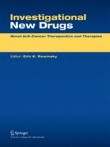
Summary
Introduction Afatinib is used to treat patients with advanced non-small cell lung cancer (NSCLC) harboring common EGFR mutations; however, the clinicopathological factors that predict this drug's effectiveness in real-world settings remain unclear. We therefore evaluated the effectiveness of afatinib in such patients and assessed potential prognostic factors. Methods We retrospectively investigated patients with NSCLC who received first-line afatinib between July 2014 and August 2018. Variables (including sex, age, performance status, neutrophil-to-lymphocyte ratio, EGFR genotype, smoking status, clinical stage prior to treatment [stage IV vs.. postoperative recurrence], presence or absence of brain metastases, body surface area, any afatinib dose reductions, and afatinib starting dose [40 vs.. 20 or 30 mg]) were subjected to a Cox proportional hazards regression model to estimate progression-free survival (PFS). Result s Forty-eight patients with a median age of 67 years were included; the objective response rate was 62.5% (30 patients). The median PFS was 14.1 months; the PFS periods were 11.8 and 15.9 months for patients receiving 40 mg versus 20–30 mg of afatinib (P = 0.41), respectively, and were 14.5 and 13.8 months for patients who required afatinib dose reduction and those who did not, respectively (P = 0.80). The PFS tended to be longer in patients without brain metastases (albeit not significantly). Ultimately, no significant predictive values for PFS were identified. Conclusions Afatinib is effective for patients with NSCLC harboring common EGFR mutations irrespective of their clinicopathological backgrounds. A direct comparison of afatinib and osimertinib in treatment-naïve patients is warranted to determine the optimal standard of care.



Δεν υπάρχουν σχόλια:
Δημοσίευση σχολίου